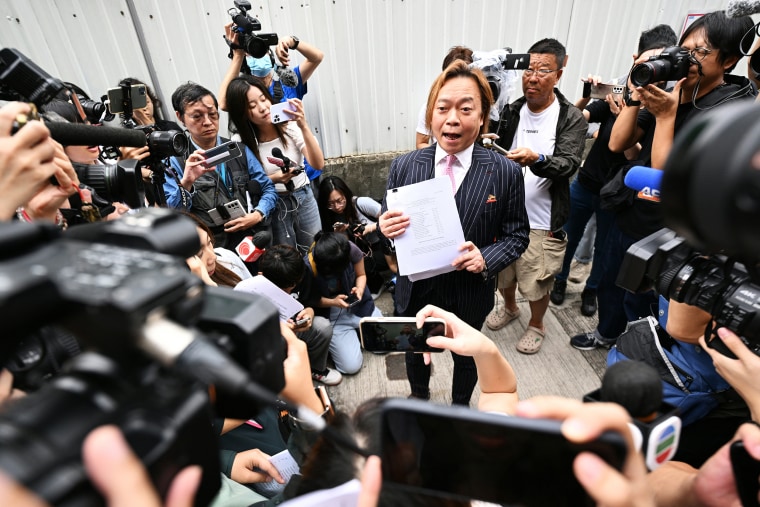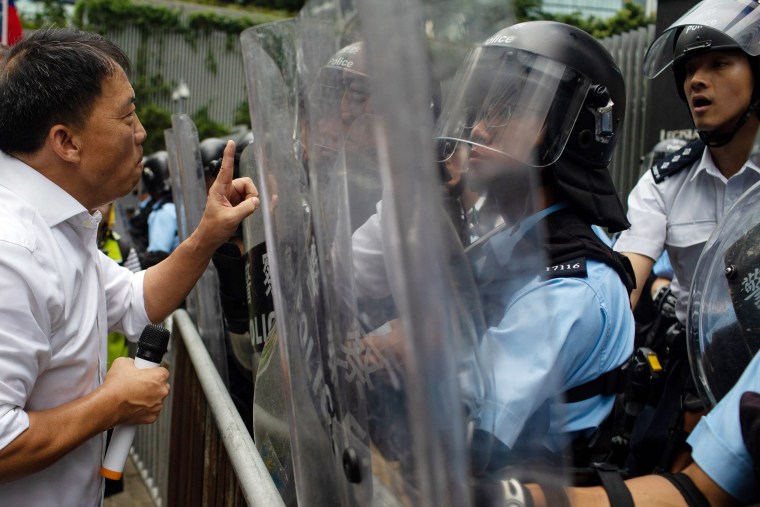HONG KONG — A Hong Kong court on Thursday found 14 of 16 pro-democracy activists guilty of conspiring to subvert the state in the Chinese territory’s single largest case under a sweeping national security law imposed by Beijing.
The three judges handpicked by the government to hear the case acquitted two of the defendants, former district councilors Lawrence Lau and Lee Yue-shun, making them the first national security law defendants to be found not guilty after trial.
The defendants are among 47 politicians, academics and other pro-democracy figures who were charged with conspiracy to commit subversion over their involvement in an unofficial primary election. Those who were convicted, along with 31 others who pleaded guilty, will be sentenced at a later date, with potential prison terms ranging from three years to life.
Critics say the trial symbolizes the decline of freedoms in the international financial hub amid a crackdown on dissent following mass anti-government protests in 2019. Most of the 47 have been held without bail since being charged in early 2021.

“This trial is not just a trial for these 47 individuals,” said Eric Yan-ho Lai, a research fellow at the Georgetown Center for Asian Law. “It’s a trial for the pro-democracy movement in Hong Kong.”
Members of the public, some of them with portable chairs, lined up hours in advance to secure a spot in the courtroom on Thursday. Scores of diplomats and local and international journalists were also in attendance amid tight security.
“This is a very significant moment for the history of Hong Kong,” a man surnamed Wong, 26, told NBC News outside the courthouse after the ruling. “This trial is one of the landmark trials that will dictate the future of Hong Kong.”
“Whoever is coming here today, people who really care about our city, people who care about Hong Kong, I want to be together with them and remember all these Hongkongers that are still staying here,” he added.
A woman surnamed Kwok, 75, said she had arrived at 6 a.m. to ensure a seat. The retiree said some of her friends had started lining up the night before.
“I'm here to support our fellow travelers,” said Kwok, who like Wong gave only her last name for fear of government retribution. “As ordinary citizens, we pursue democracy and freedom. That’s all. It’s as simple as that.”
Across the street from the West Kowloon Law Courts Building before the ruling, veteran Hong Kong activist Alexandra Wong, also known as “Grandma Wong,” waved a large British flag in a nod to Hong Kong’s colonial past as police officers looked on.
She continued to wave it well after the courthouse emptied following the judges’ brief remarks. Many of the spectators lingered nearby afterward, with one woman comforting another in tears.
The Hong Kong 47 case has been criticized by the United States, Britain and others as politically motivated.
“This unprecedented mass conviction is the most ruthless illustration yet of how Hong Kong’s national security law is weaponized to silence dissent,” Sarah Brooks, Amnesty International’s China director, said in a statement Thursday.
John Lee, Hong Kong’s top leader, said in a statement that the conviction of 45 out of the 47 defendants showed the “scale and seriousness” of their “criminal plan.”
The Chinese Foreign Ministry said Thursday that Hong Kong is governed by the rule of law and that Beijing supports the local government’s law enforcement and judicial authorities.
Lee, the former district councilor, was escorted by police officers and thronged by reporters as he left the courthouse.
“Thank you for all your care and support over the years. We have seen and felt your love,” he said.
He declined to comment on the ruling itself, citing the possibility of a government appeal, which prosecutors later told the court they would pursue in both his and Lau’s cases. The court extended their bail conditions, which prevent them from leaving Hong Kong.
Lau, 56, told reporters, “I should not be the focus for today. I hope everyone will continue caring for other friends in the case.”
The 47 range in age from their 20s to their 60s and include prominent names such as legal scholar Benny Tai, former pro-democracy lawmaker Claudia Mo and Joshua Wong, best known internationally as a leader of pro-democracy protests in 2014.
The defendants who pleaded not guilty and were convicted on Thursday include former lawmakers Leung Kwok-hung and Raymond Chan and journalist-turned-activist Gwyneth Ho. They went on trial in Feb. 2023 and had been waiting for a ruling since it ended in December.
Hong Kong previously had a 100% conviction rate in national security cases, which are prosecuted under rules that diverge from the city’s legal norms, including presumption against bail. Almost 300 people have been arrested under the national security law, which came into force in the summer of 2020.
The charges stem from an informal primary election held in July 2020 in which more than 600,000 voters selected pro-democracy candidates for a legislative election that was scheduled for that September. Many of the candidates in the primary election had vowed to repeatedly veto the government’s proposed budget in an effort to force the resignation of Carrie Lam, who was then the city’s leader and seen as resistant to the 2019 protesters’ democratic demands.
Officials warned at the time that the election might violate the national security law that Beijing had imposed less than two weeks earlier in response to the 2019 protests, which roiled Hong Kong for months and sometimes turned violent.
Hong Kong and Chinese officials said the law, which criminalized secession, subversion, terrorism and collusion with foreign forces, was necessary to restore stability. But critics say it has driven a broad crackdown on dissent in Hong Kong, a former British colony that was promised its Western-style liberties would be preserved for 50 years upon its return to Chinese rule in 1997.
In Jan. 2021, more than 50 activists were arrested in connection with the unofficial primary, 47 of whom were later charged. The legislative election, which officials had postponed citing the pandemic, was held in December 2021 after election laws were overhauled to ensure that only “patriots” could run for office.
During the trial, prosecutors argued that the defendants were trying to paralyze the Hong Kong government by agreeing to indiscriminately veto government budgets. They noted that Tai, a main organizer of the primary, had said pro-democracy lawmakers could use a majority in the legislature as a “constitutional weapon of mass destruction.”
The defendants’ lawyers argued that the maneuver their clients planned to use was constitutional and that the means of subverting state power could not be “unlawful” unless they involved physical violence or criminal conduct.

The judges disagreed, saying that unlawful means used to commit subversion are not limited to nonviolent acts. They said if the defendants had been successful in their efforts, it would have amounted to “a serious interfering in, disrupting or undermining the performance of duties and functions in accordance with the law” by the Hong Kong government.
Explaining their acquittals of Lau and Lee, they said they were unsure whether the two men intended to subvert state power.
Those who pleaded guilty, including four who testified for the prosecution, may have been hoping for sentence reductions of up to one-third. The 14 defendants who pleaded not guilty and were convicted Thursday will also have the opportunity to ask for more lenient sentences at later hearings.
Some, such as Wong, have already been sentenced to prison after being charged in multiple other cases related to the 2019 protests or banned memorials for victims of the 1989 Tiananmen Square crackdown.
Even those who are not serving other sentences have mostly spent more than three years in detention, missing out on years with their families amid repeated delays in their trial. One of them, Wu Chi-wai, a former leader of the Democratic Party, has lost both his parents since he was detained.